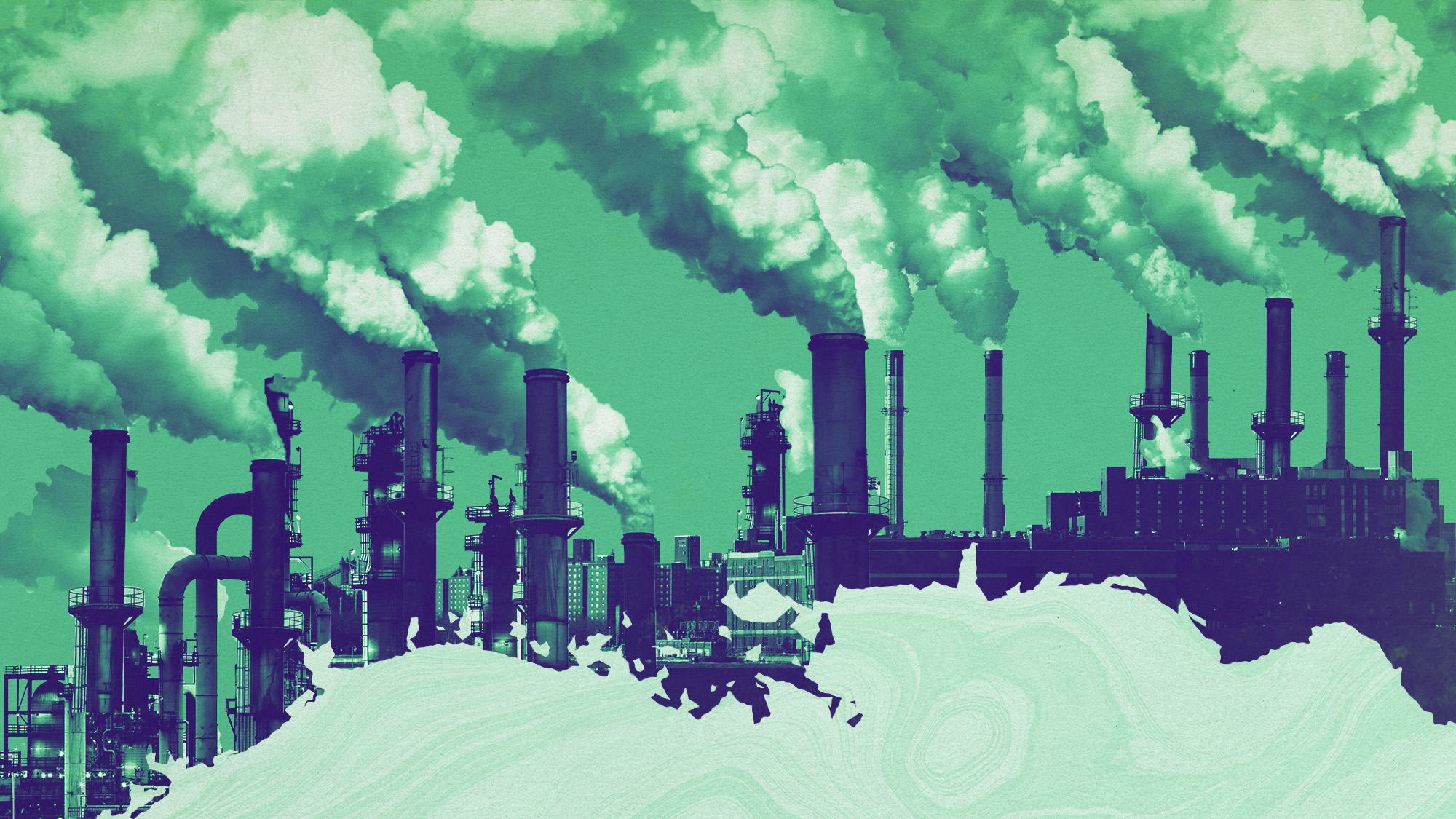Poor pollution regulation (still) impacts the lives of Gulf Coast residents
Many people in the region are experiencing health problems as a result of nearby refineries


A free daily email with the biggest news stories of the day – and the best features from TheWeek.com
You are now subscribed
Your newsletter sign-up was successful
It is estimated that the United States' "most climate-vulnerable communities are along the industrialized Gulf Coast," according to an environmental index cited by Scientific American. The Gulf is a "flood- and hurricane-prone region with deep pockets of poverty, poor health and economic and racial inequities," the outlet added, and much of this is due to the "area's legacy of industrial pollution and high cancer rates."
While the causes of environmental hazards within the Gulf Coast are clear, the hardships are ongoing for residents of the area due to lackadaisical regulations on regional pollution. Much of the pollution comes from the mass quantities of oil refineries on the Gulf Coast. In 2021, it was reported that the Gulf's Houston-area refineries alone account for "more than a quarter of [crude oil] production in the United States." Most of these refineries also have very few air pollutant regulations.
If the problems with pollution are known throughout the Gulf Coast, why has it been such a challenge to implement proper regulations? And what legacy is being left for the people of the region as a result?
The Week
Escape your echo chamber. Get the facts behind the news, plus analysis from multiple perspectives.

Sign up for The Week's Free Newsletters
From our morning news briefing to a weekly Good News Newsletter, get the best of The Week delivered directly to your inbox.
From our morning news briefing to a weekly Good News Newsletter, get the best of The Week delivered directly to your inbox.
How is pollution affecting the Gulf Coast?
Many people in the region "experience negative health impacts from pollution issued from local refineries and plants," The Washington Post reported. The Post added that this can include "odd smells; itchy noses, throats and eyes; and frequent fires."
The chemicals used in Gulf Coast refineries often lead to residents being exposed to toxic carcinogens such as benzene. Most people affected by these carcinogens are "people of color and low-income individuals" who disproportionately live closer to industrial areas, the Post reported.
The problem with environmental hazards in the region is not new: A 1981 Texas Monthly article described Texas' Gulf cities as "the Cancer Belt." However, the issue has been turbocharged in recent decades as a result of continued refining. "Our health lets us know that something isn't right," Lois Malvo, a resident of Lake Charles, Louisiana, told the Post. She said that the residents of her town were "being attacked by the industry because we're vulnerable people." And while Texas has its Cancer Belt, a stretch of southeastern Louisiana is often referred to as "Cancer Alley" for the similar health issues seen throughout.
The broader Gulf Coast region is also prone to natural disasters that can compound these issues. In anticipation of Hurricane Laura's landfall in 2020, Texas refineries "began shutting down, hurriedly burning off unprocessed chemicals and releasing vast amounts of pollution," The Texas Tribune reported. This resulted in "an additional 680,000 pounds of pollution" being released into the atmosphere.
A free daily email with the biggest news stories of the day – and the best features from TheWeek.com
What regulations are in place?
Regulations surrounding these emissions "inhabit a legal gray area," the Tribune noted. While the Environmental Protection Agency (EPA) has tried to enforce regulatory decisions, "the decision to penalize polluters largely lies with state regulatory agencies — who rarely punish companies." An analysis by Texas' own regulators found that the state government "pursues penalties and monetary fines in just 8% of cases."
And the steps that are being taken are relatively new. The EPA "has only recently begun to crack down on air pollution in the region," agency employees told the Post. Despite this recent enforcement, "eight facilities continued to release excessive amounts of [benzene], which is one of the most dangerous pollutants that these industries emit," the Post reported. Of these eight facilities, "all but one of them are near disadvantaged communities in Texas and Louisiana."
Then there are the policies in place that seemingly work to protect the polluting companies. When environmental groups in Texas complained about the expansion of a polluting oil terminal in Port Lavaca, the company involved claimed that the groups "had no right to bring forth a challenge because they lived more than one mile" from the terminal in question, the San Antonio Express-News reported. However, Texas' environmental regulation commission told the Express-News they had "never adopted a one-mile policy."
What's next for regulators?
The Biden administration has been working to implement further regulations for the Gulf Coast, and last year "proposed a new regulation to significantly reduce hazardous air pollutants from chemical plants," The New York Times reported. The regulations would apply to "more than 200 facilities spread across Texas and Louisiana" and elsewhere along the Gulf Coast. It would additionally "update several regulations governing emissions from chemical plants, some of which have not been tightened in nearly 20 years."
Despite this, enforcement of regulations is still hard to come by in the region. "We put all the data together and then enforcement never happens," Wilma Subra, a Louisiana chemist, told the Post. "And we're running out of this administration's time."
Justin Klawans has worked as a staff writer at The Week since 2022. He began his career covering local news before joining Newsweek as a breaking news reporter, where he wrote about politics, national and global affairs, business, crime, sports, film, television and other news. Justin has also freelanced for outlets including Collider and United Press International.
-
 How the FCC’s ‘equal time’ rule works
How the FCC’s ‘equal time’ rule worksIn the Spotlight The law is at the heart of the Colbert-CBS conflict
-
 What is the endgame in the DHS shutdown?
What is the endgame in the DHS shutdown?Today’s Big Question Democrats want to rein in ICE’s immigration crackdown
-
 ‘Poor time management isn’t just an inconvenience’
‘Poor time management isn’t just an inconvenience’Instant Opinion Opinion, comment and editorials of the day
-
 The environmental cost of GLP-1s
The environmental cost of GLP-1sThe explainer Producing the drugs is a dirty process
-
 As temperatures rise, US incomes fall
As temperatures rise, US incomes fallUnder the radar Elevated temperatures are capable of affecting the entire economy
-
 Climate change could lead to a reptile ‘sexpocalypse’
Climate change could lead to a reptile ‘sexpocalypse’Under the radar The gender gap has hit the animal kingdom
-
 Why scientists want to create self-fertilizing crops
Why scientists want to create self-fertilizing cropsUnder the radar Nutrients without the negatives
-
 The former largest iceberg is turning blue. It’s a bad sign.
The former largest iceberg is turning blue. It’s a bad sign.Under the radar It is quickly melting away
-
 How drones detected a deadly threat to Arctic whales
How drones detected a deadly threat to Arctic whalesUnder the radar Monitoring the sea in the air
-
 ‘Jumping genes’: how polar bears are rewiring their DNA to survive the warming Arctic
‘Jumping genes’: how polar bears are rewiring their DNA to survive the warming ArcticUnder the radar The species is adapting to warmer temperatures
-
 Crest falling: Mount Rainier and 4 other mountains are losing height
Crest falling: Mount Rainier and 4 other mountains are losing heightUnder the radar Its peak elevation is approximately 20 feet lower than it once was
